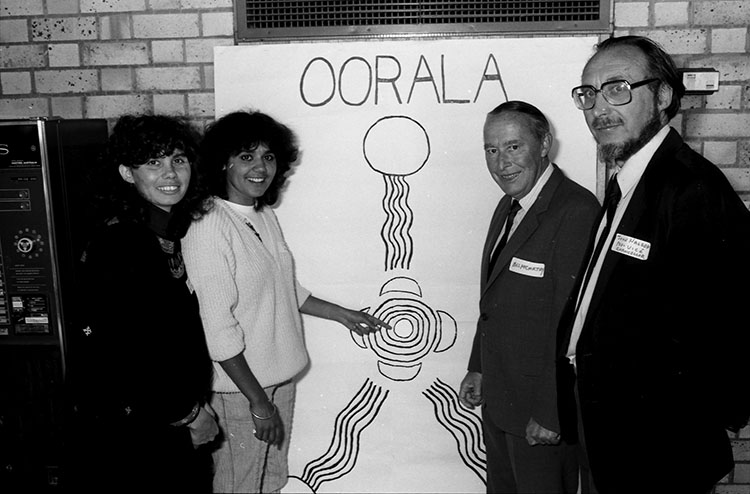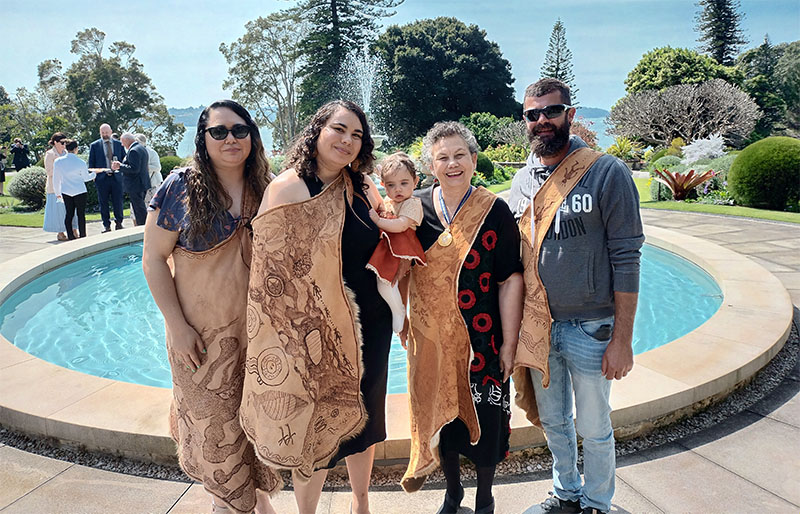When trailblazing Wiradjuri and Gamilaroi woman Associate Professor Lynette Riley accepted her Order of Australia Medal last September she was resplendent in a kangaroo-skin cloak she’d made to honour her people’s heritage.
At the time, Lyn said the award was the most inspiring compliment she had ever received. But not because it was presented by the NSW Governor on behalf of the King of the Commonwealth. “I didn’t see it as coming from non-Indigenous Australia at all, but from the colleagues [in the Aboriginal Education Council and the Research Centre for Children and Families] who had nominated me, who were saying they held me in high esteem,” Lyn says. “I don’t do what I do to get accolades. I’m just a little slogger who works in the background to make things happen for Aboriginal people.”
And as the AO for distinguished service to education, reconciliation and her community would suggest, Lyn’s very good at that – at the grassroots and institutional level. Over the past 40 years she has been a pioneering teacher, Aboriginal education consultant, researcher and lecturer within schools, TAFE, the NSW Education Department (DET) and universities. She was one of the founding members of DET’s Aboriginal Education Unit that created the first Aboriginal Education Policy in Australia, in 1982, and helped develop Indigenous curricular and support programs that have paved the way for countless First Nations students to complete TAFE and university studies.
And all this from a “quiet little kid”, who liked nothing better than playing teacher to her five younger siblings in their backyard cubby. A young woman who went on to become the first in her family to finish high school, then a primary teaching degree at the Armidale College of Advanced Education, later absorbed into UNE.
“My parents were only allowed to be educated to third grade; in those days they reckoned Aboriginal people were incapable of higher forms of education,” Lyn says. “Me finishing high school was the most important thing to them because it was proof that they could have done it, too, if they’d been given the chance.
“There were so few of us getting an education and getting into any reasonable positions at that time. My parents wanted me to get this education to help create positive change for Aboriginal people from within.”
After becoming a Research Fellow at UNE in 1986, Lyn set about creating a strong support network for Indigenous students, individually and collectively. “The first thing was to provide safe, 24-hour access to computers and housing. We introduced some subsidised accommodation through Aboriginal Hostels, which was a godsend, and I started UNE on the path to becoming one of the first universities in Australia to take a coordinated approach to developing Aboriginal studies and education across all faculties. It wasn’t easy, but other universities are still looking at doing this, 30-odd years later.”
Lyn considers founding UNE’s ground-breaking Oorala Aboriginal Centre among her greatest achievements – outside her seven children – and is proud that the Frank Archibald Memorial Lecture series and Yarm Preschool she established are both still going strong.
 Lyn Riley (far left) with Cheryl Kitchener, Bill McCarthy (NSW member for Northern Tablelands) and John Nalson (Pro Vice Chancellor, UNE) at the opening of Oorala in 1986.
Lyn Riley (far left) with Cheryl Kitchener, Bill McCarthy (NSW member for Northern Tablelands) and John Nalson (Pro Vice Chancellor, UNE) at the opening of Oorala in 1986.
“I created an Aboriginal Advisory Group at UNE and was lucky to have great community and executive support,” Lyn says. “The only Aboriginal people employed at the university at the time were cooks, cleaners and groundsmen, but we changed that, and worked hard to increase Aboriginal student enrolments. Everyone was really focused on improving what the university was doing firstly for Aboriginal students and secondly for educating non-Indigenous students and staff about Aboriginal people, history and culture.
“In my seven years at UNE we increased Aboriginal student enrolments internally to over 100 and externally to over 200. We had Aboriginal Education offerings from Associate Diploma through to a Graduate Diploma, and people were starting to develop higher degrees as well. But we could not have achieved what we did without the full participation of the local Aboriginal community, who I relied on.”
Today, Lyn is chair of Aboriginal Education and Indigenous Studies and a Senior Lecturer in the Sydney School of Education and Social Work at the University of Sydney. She is also co-chair of the National NAIDOC Committee, an advisor to the OCHRE Steering Committee and on the board of the Aboriginal Languages Trust.
With a long history of working for reconciliation at the local and state level, she was “absolutely shattered and appalled” by last year’s national referendum result, which rejected constitutional recognition for the First Peoples of Australia.
“I still have my moments, when I just don’t understand how people could have voted no,” she said. “But it has taught me just how much more education is required, and I now know there is more I have to do. Sitting on the top of my shoulders are all those old people saying ‘you think you’ve got it tough’ and I just have to keep going.”


